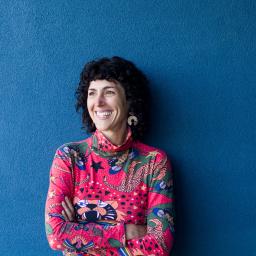We are living at a time of great challenge and change. This is evident every time we open a newspaper. We see the effect that these many intersecting crises have on the mental health of our students, and the way these struggles weigh on the families and communities we serve.
At their core, the biggest challenges we face, both personally and collectively, can be understood as crises of creativity and imagination. In this time of peril and possibility, we are being called upon to activate the innate creativity that exists within us, and to help our students do the same. By opening wide our radical imagination, we become able to discover the hope and possibility within the challenges we face, allowing for the emergence of new visions for the future—one of justice, care and mutual thriving.
While there are many ways to define creativity, one way I think of creativity is as a codeword for God. To be in creative practice is to open ourselves as a vessel through which new energy can flow through us and into the world. It is to be in dialogue, calling out to and listening for what comes from the depths inside us. Creativity is the word for that feeling when the universe moves through us and we are lit up from the inside out by new ideas, images and insights.
When we are in touch with our creativity, we are alive with possibility. Cultivating our creativity and a robust relationship with our imagination is how we find not only refreshment in an atmosphere of chaos, overwhelm and uncertainty, but also how we build our capacity to process challenges and be open to change. Unlocking our creativity helps us to bring forth beauty, mend the world and heal the broken places in our souls.
Creativity is perhaps our greatest untapped resource. Many of us in the Western world were schooled to conflate creativity with artistic aptitude. If we weren’t skilled at drawing still lifes, we were left to conclude—or more detrimentally, told explicitly by some well-intentioned adult—that we are not creative. Yet the Torah teaches that creativity is our very birthright and foundational to Judaism. The first three words of the Torah are Bereishit bara Elohim—“In the beginning, God created.” God’s first act is one of creativity. Only a few verses later we read that humans are created betzelem Elohim (“in the image of God”). If God is, first and foremost, a creator, and we are created in God’s image, then we too are created to be creators. Each of us is endowed with creative capacity simply by being human.
Accessing and activating our inherent creativity is essential for educators as much as it is a core competency to nurture in those we teach. We cannot teach something that we ourselves do not practice. For, as we all know, we teach not only through our words and lesson plans, source sheets and slide decks, but through the very energy and presence and depth of spirit—through the care, curiosity and creativity we bring to whatever material we offer.
At this time in which educators are stretched perhaps more than ever before, we need time in which to do our own learning and play, places and practices to cultivate our own creativity and ignite our own imagination, not just for ourselves, but for the ways that benefit the students, families and communities we serve.
In our work at Jewish Studio Project, we help people activate their creativity as a Jewish practice for spiritual connection and social transformation. Through our core methodology, the Jewish Studio Process, we offer art-making—the simple yet profound experience of playing with materials—combined with generative and accessible text study to help educators tap into their own essential creative capacities and discern how best to nurture these capacities in their learners.
Over the past eight years we have worked with educators serving nearly every type of Jewish educational setting—from day schools to camps, from rabbinical schools to ECE—to help them discover, draw from and delight in their inherent creativity. Through ongoing community programs, immersive experiences, creative facilitator training and professional development partnerships, JSP is building a movement to activate the creative power of the Jewish community.
Creativity is the power that allows each of us to work with all that exists inside and around us, holding, handling, witnessing and transforming it into something whole and new. To live from our creativity is to be able to work with any challenge that life presents us, seeing nothing as final and everything as a process. As human beings created in the Divine image, we are here to participate in creation—all of us. As Jewish educators, may we nurture this deep and powerful impulse within ourselves and our students and, in so doing, bring about the world we seek.



